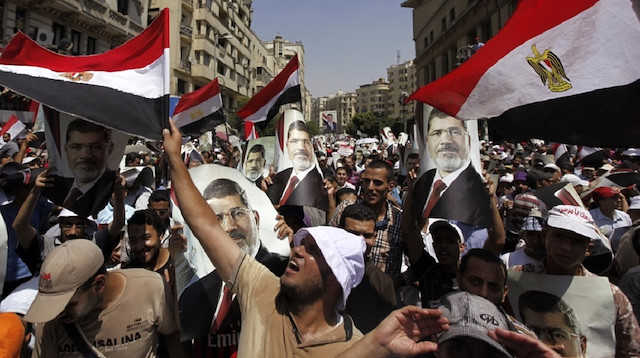
Since its establishment in 1928, Egypt's Muslim Brotherhood (MB) group has been subject to endless accusations of violence -- despite its oft-stated commitment to a policy of non-violence.
Over the years, the Egyptian authorities have repeatedly outlawed the group, frequently throwing its leading members behind bars.
“The group is constantly being accused of violence -- accusations it continues to vociferously deny,” Egyptian political analyst Kamal Habib told Anadolu Agency.
“Unfortunately, this cycle is likely to continue as long as it fails to articulate a clear policy,” he said.
An expert on religious groups, Habib urged the MB leadership to “avoid ambiguous rhetoric and to state clearly -- in a document -- its rejection of violence”.
Habib called on the group to issue a manifesto similar to its book, "Preachers Not Judges", published in the 1960s, which, he said, had “articulated its clear and decisive rejection of takfiri ideology [by which dissenters are accused of apostasy]”.
When the MB was founded during the British occupation of Egypt (1882-1956), it had an anti-colonialist paramilitary group that also took part in the 1948 Palestine War against invading Zionist forces.
In March of 1948, the Egyptian authorities accused two MB members of murdering a judge, Ahmad al-Khandar, who had been handling a case involving several group members.
In response, the MB condemned the judge’s murder, claiming the pair had acted independently of the group.
In December of the same year, Egyptian Prime Minister Mahmoud al-Nokrashy Pasha was killed by a member of the MB’s “special apparatus” after calling for the group’s dissolution and the confiscation of its funds.
At the time, MB founder Hassan al-Banna reacted to developments with the words: “Actions have been attributed to some of those who entered the group -- without adopting its true spirit or adhering to its approach -- which has put the group under suspicion.”
Al-Banna went on to stress the peaceful nature of Islam, asserting that perpetrators of violence “cannot be members of the Brotherhood or Muslims”.
Despite being the group's most outspoken voice against violence, al-Banna, paid the ultimate price for his convictions: in 1949, he was assassinated in Cairo by unidentified gunmen.
In January of 1954, then President Gamal Abdel-Nasser issued a decision formally outlawing the group.
In October of the same year, the MB was accused of attempting to assassinate Nasser as he delivered a speech in Alexandria.
Two months later, an Egyptian court slapped six leading group members with death sentences for their alleged roles in the incident.
Until today, however, the MB continues to deny any involvement in the affair, which it says was “staged” to give Nasser a justification for cracking down on the group -- which at the time had been Egypt’s largest opposition group.
In 1965, when Nasser was still president, thousands of MB members were rounded up and accused of attempting to “revive” the group.
The crackdown ended with the execution of several of the group’s leading members, including celebrated author and intellectual Sayyid Qutb.
Despite the outlawed group’s relative absence from the political scene, it was nevertheless frequently accused of serving as an “inspiration” for extremist groups.
In an interview with a German newspaper in 2004, then President Hosni Mubarak accused the group of masterminding the assassinations of the 1940s.
In 1995, 1999, 2001 and 2006, leading MB members were again hauled before military tribunals to answer charges of attempting to “revive” the group.
Yet despite the MB’s tenuous relationship with the Mubarak regime, it was nevertheless allowed to take part in politics by fielding parliamentary candidates as nominal “independents”.
In 1995, the MB issued a seminal document in which it announced its rejection of all forms of violence and stressed its commitment to the constitution and law.
The group faced the toughest crackdown in its history in 2013 after Mohamed Morsi, an MB leader and Egypt’s first freely elected president, was ousted in a military coup led by then Defense Minster -- and current President -- Abdel Fattah al-Sisi.
In the wake of the 2013 coup, Saudi Arabia, the United Arab Emirates and Bahrain all followed Egypt’s lead by dubbing the MB a “terrorist organization” -- a claim the group still denies to this day.














